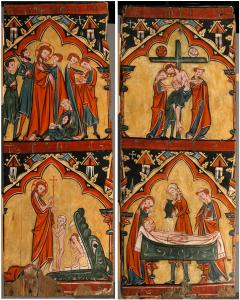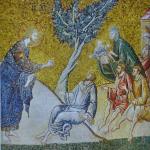
Paul told us of the two-part journey of the God-man, Jesus. The first part of the journey was the kenotic descent of the God-man all the way down to the depths of the earth (that is, to death and the edge of being itself). The second part is found in the glorification of the God-man, where the God-man, having experienced the full range of potentiality contained within being, is raised from the dead and then ascends all the way through the heavens to the “right hand of God.” This way, Paul said, Christ, the God-man, is able to give the gift of grace to all because the God-man has personally journeyed throughout the full range of being, allowing the God-man to have a personal presence everywhere within the realm of being. Everyone has the opportunity to meet the God-man, in one form or another, joining themselves to the journey of the God-man so that in the end, they can and will be taken in by Christ and raised in glory:
But grace was given to each of us according to the measure of Christ’s gift. Therefore it is said, “When he ascended on high he led a host of captives, and he gave gifts to men.” (In saying, “He ascended,” what does it mean but that he had also descended into the lower parts of the earth? He who descended is he who also ascended far above all the heavens, that he might fill all things.) (Ep. 4:7-10 RSV).
Thanks to the God-man’s journey, Christ has dispersed a variety of gifs throughout the world.. Through them, and the grace contained in them, Christ gives out various charisms, various fruits of the Spirit, so that through them, those who join themselves to Jesus can also join themselves in and continue the work of Christ in the world. They have the Spirit of Christ in them. They have become a part of the body of Christ, so now they share in the ministry of Christ. They should spread grace throughout the world so that through it, everyone can be brought together and made one in the body of Christ. Indeed, they will find that it is only when they come together as one will they be able to attain their full potential, that is, their spiritual maturity in Christ:
And his gifts were that some should be apostles, some prophets, some evangelists, some pastors and teachers, to equip the saints for the work of ministry, for building up the body of Christ, until we all attain to the unity of the faith and of the knowledge of the Son of God, to mature manhood, to the measure of the stature of the fulness of Christ (Eph. 4:11-13 RSV).
We are called to work together, to build each other up. We are not mere individuals working out our salvation all alone; we are to work out our salvation with each other, helping each other with the gifts which have been given to us so that together, not apart, we can attain perfection. Individualism continues to divide what is meant to be united; individualism within the church denies the church, for it denies the communion which makes the church. How can we be one with Christ if we deny the bonds of unity, that is, if we hold onto ourselves as individuals set apart from everyone else? We are meant to take the grace given to us and use it to follow the example of Christ who embraced kenosis, so that, if we all embrace self-giving love, no one will be left untouched by grace.
Christ deeply desires to join all things together as one so that together as one they will be able partake of the divine life together. Apart from each other, divided from each other, everything will end up away from Christ. It would seem that any attempt by us to raise ourselves up without any connections to others comes out of pride, and such pride will first lead us to stumble, and if we do not learn our lesson then, it will lead us to have a great fall from grace, imitating, in a way, the original fall. But if we cut ourselves off from such self-attachment, if we follow Christ and give ourselves to others out of love, we will find ourselves open to the grace which we need; the more we empty ourselves off from self-attachment and open ourselves to others, the more we will be able to unite with them, and in that unity, find ourselves taken up by Christ and ascend to heights beyond our expectation or comprehension.
John the Baptist, of course, understood this; he knew when Christ came to him, his time was nearly at an end. When John was arrested, it might have silenced his voice, but it only set in motion the voice of Christ:
Now when he heard that John had been arrested, he withdrew into Galilee; and leaving Nazareth he went and dwelt in Capernaum by the sea, in the territory of Zebulun and Naphtali, 14 that what was spoken by the prophet Isaiah might be fulfilled: “The land of Zebulun and the land of Naphtali, toward the sea, across the Jordan, Galilee of the Gentiles — the people who sat in darkness have seen a great light, and for those who sat in the region and shadow of death light has dawned.” From that time Jesus began to preach, saying, “Repent, for the kingdom of heaven is at hand” (Matt. 4:12-17 RSV).
John had preached repentance, preparing the way for the kingdom of God. With Christ, the kingdom of God had come, but that did not mean we no longer needed to repent. Christ preached repentance, just as John had done, but now Christ brought with that preaching the grace which was necessary so that through repentance, we could participate in and experience in the kingdom of God for ourselves. The first thing we need to do is to deny ourselves, which does not mean, of course, to deny our personal goodness, but rather, to deny the individualistic mode of existence which promotes our personal good as an absolute good above all other goods. This is because such individualism does not allow for true love. To love, we must look beyond our ourselves. When we are told to repent, we find we must change our mind, our mode of existence; we must return to the path of love. We must embrace others with that love. And then, when we do so, we will find ourselves embracing Christ in and through them, even as we will allow others to embrace us with love. And through that mutual embrace we will find Christ is at work, embracing us all, using the love established in such embrace to unite with us, and in that unity, we will find ourselves receiving our share of the glory of the resurrection. The God-man came to take us all in; let us, therefore, cast aside all the barriers of unlove and be taken in by Christ.
Stay in touch! Like A Little Bit of Nothing on Facebook.
If you liked what you read, please consider sharing it with your friends and family!












